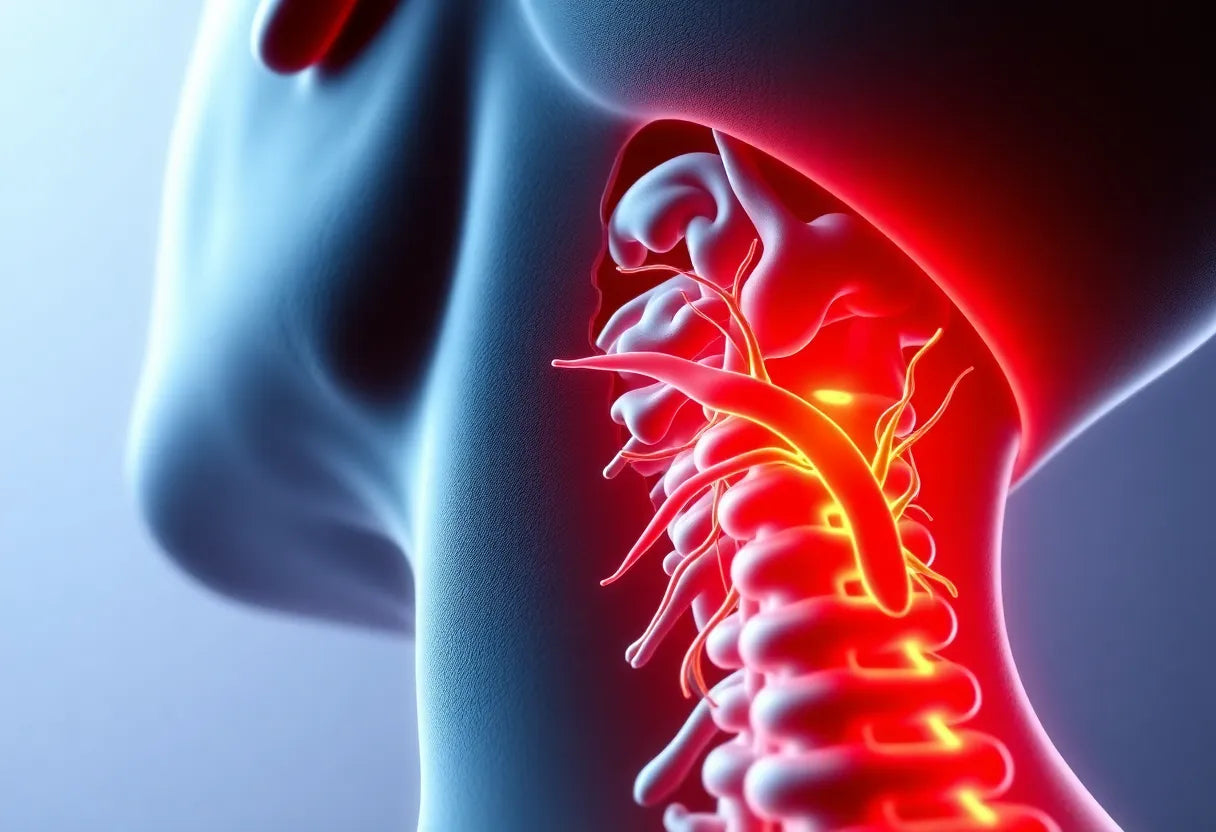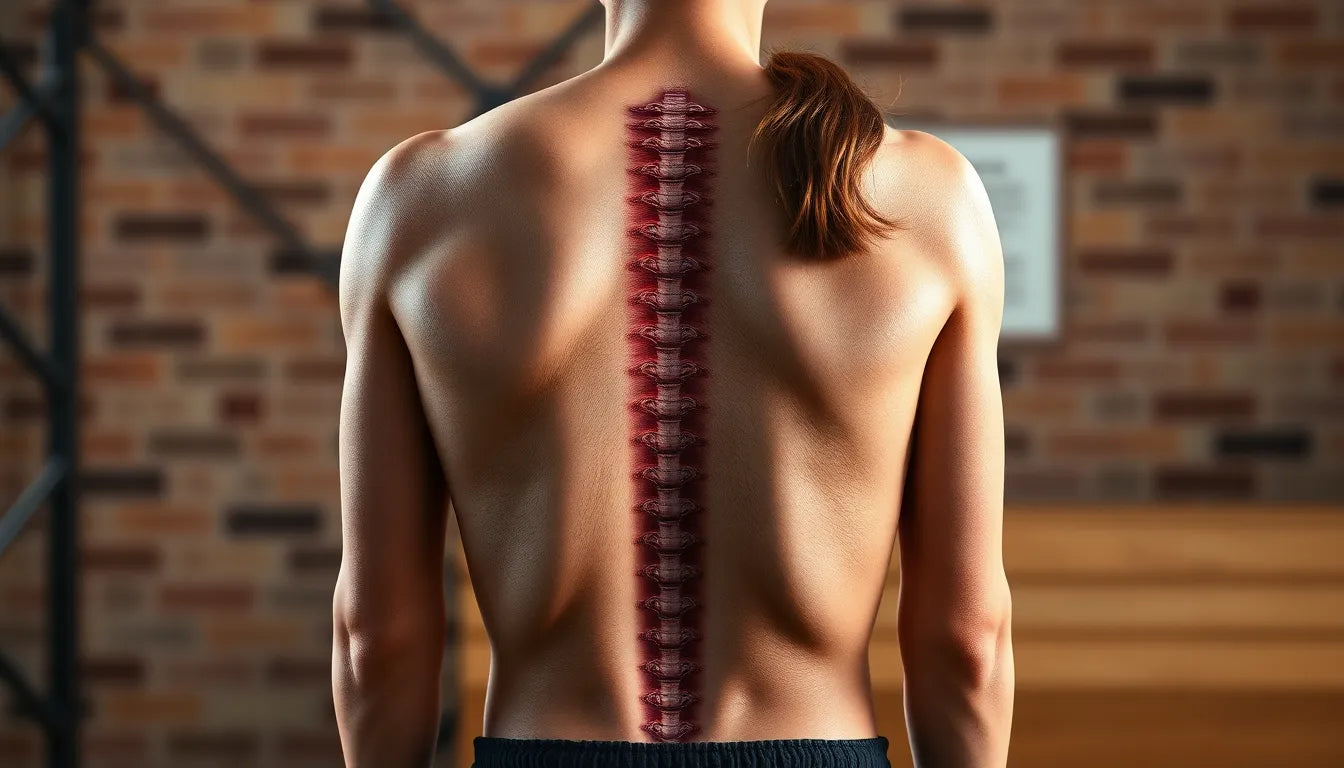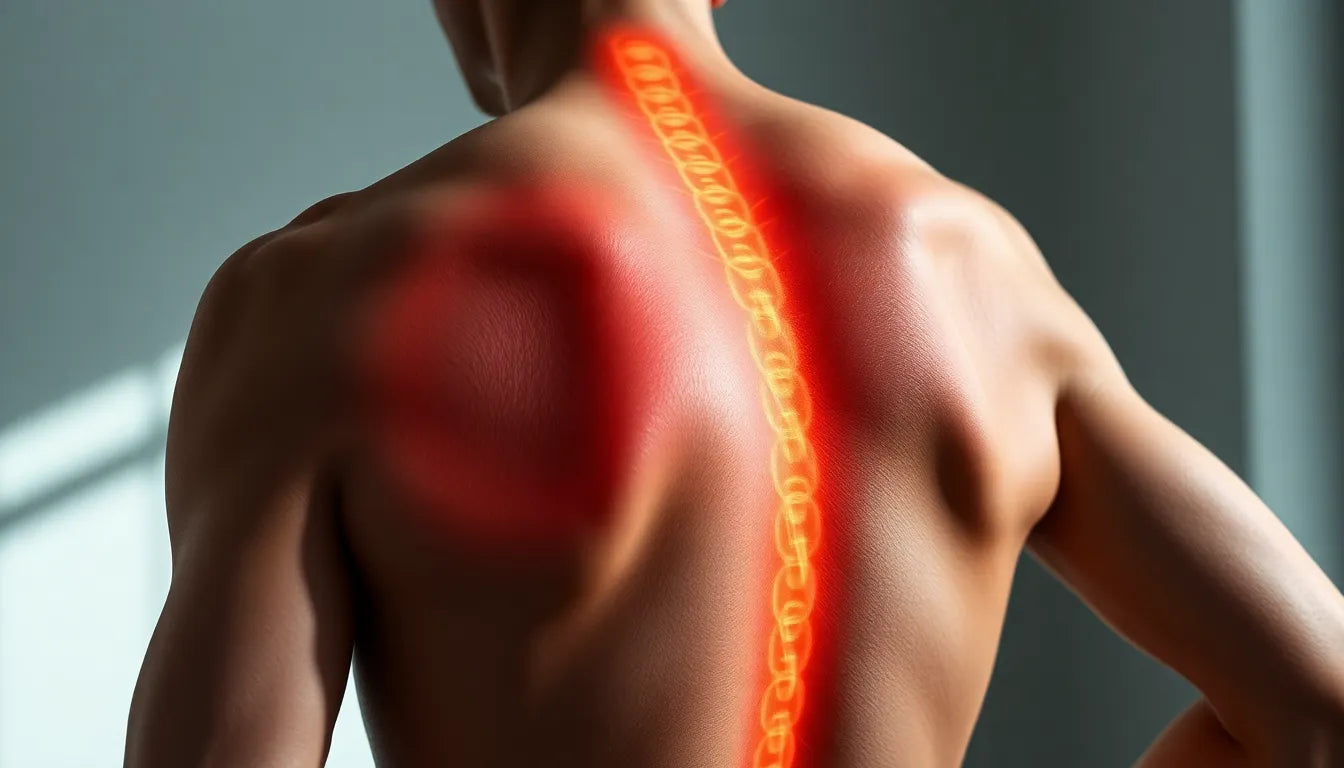Neck pain is a common ailment that many of us experience at some point in our lives. However, when this discomfort is accompanied by other symptoms like numbness or tingling, it could be a sign of something more serious: a pinched nerve in the neck, medically known as cervical radiculopathy. This condition can significantly impact daily life, making even simple movements painful and challenging.
Understanding the prevalence of neck pain and related symptoms is crucial. It’s not just about discomfort; it’s about recognizing the early warning signs that could indicate a pinched nerve. Early detection is vital for preventing further complications and improving treatment outcomes. In this post, we'll delve into the warning signs of a pinched nerve in the neck, helping you identify and understand the symptoms before they become debilitating.
what is cervical radiculopathy?
Cervical radiculopathy occurs when a nerve in the neck is compressed or irritated, leading to a variety of symptoms that can affect the neck, shoulders, arms, and even the hands. This condition often arises from common issues such as disk degeneration, herniated discs, or trauma. As we age, the disks in our spine can wear down, leading to a narrowing of the nerve pathways. This degeneration can put pressure on the nerves, resulting in the uncomfortable symptoms associated with a pinched nerve.
Other contributing factors can include sudden injuries or repetitive strain from certain activities. Understanding these causes is essential in both preventing and managing the condition effectively.
importance of early detection
Recognizing the symptoms of a pinched nerve early on can make a significant difference in treatment outcomes. Early detection allows for timely intervention, which can prevent the condition from worsening and reduce the risk of long-term damage. By being aware of the warning signs, you can seek appropriate medical advice and take steps to alleviate the symptoms before they become more severe.
This blog post aims to guide you through identifying these warning signs, providing you with the knowledge needed to take proactive steps in managing your neck health. Whether you're experiencing mild discomfort or more pronounced symptoms, understanding what your body is telling you is the first step towards effective treatment and relief.
common symptoms of a pinched nerve in the neck
Identifying the symptoms of a pinched nerve in the neck can be the first step towards effective treatment and relief. One of the most common indicators is pain that radiates from the neck into the shoulder, arm, or even the hand. This pain can manifest in various forms, such as sharp, burning sensations or dull aches, and is often exacerbated by neck movements. Such pain patterns are not only discomforting but can also disrupt daily activities, making it essential to recognize these signs early.

Men's Posture Shirt™ - Black
Patented posture shirt activates muscles and can relieve neck and back pain.
sensory changes and their impact
Another telltale sign of a pinched nerve in the neck is sensory changes, including numbness and tingling sensations often described as "pins and needles." These symptoms typically occur in the arm and hand and can intensify with specific neck movements. Such sensory disruptions can significantly affect one's ability to perform tasks that require fine motor skills, highlighting the importance of addressing these symptoms promptly.
motor symptoms: understanding muscle weakness
Muscle weakness is a critical symptom that may accompany a pinched nerve. This weakness can affect the arm or hand, leading to difficulties with grip strength and coordination. In some cases, individuals may also experience a loss of sensation and reduced reflexes, further complicating their ability to carry out everyday tasks. Recognizing these motor symptoms is crucial for seeking timely medical intervention and preventing further deterioration.
additional symptoms to watch for
headaches and dizziness
Beyond the more common symptoms, individuals with a pinched nerve in the neck may also experience headaches and dizziness, a condition known as cervical vertigo. These symptoms can cause disorientation and affect balance, making it challenging to engage in routine activities. Understanding the connection between these additional symptoms and a pinched nerve can aid in achieving a comprehensive diagnosis.
variability and mimicking conditions
It is important to note that the symptoms of a pinched nerve in the neck can vary significantly between individuals. In some cases, these symptoms may mimic other serious conditions, such as heart attacks or carpal tunnel syndrome. This variability underscores the necessity for an accurate diagnosis to ensure appropriate treatment. If symptoms are severe or sudden, seeking emergency care is advisable to rule out other potential health issues.
diagnostic methods for cervical radiculopathy
clinical examination and its role
A thorough clinical examination is often the first step in diagnosing a pinched nerve in the neck. During this assessment, a healthcare professional will evaluate the symptoms, test reflexes, and identify which nerve roots are affected. This initial evaluation provides a foundation for further diagnostic testing, ensuring a comprehensive understanding of the condition.
imaging and specialized tests
To confirm a diagnosis and differentiate a pinched nerve from other conditions, imaging tests such as MRI and X-rays are commonly used. These tests provide detailed images of the cervical spine, allowing doctors to pinpoint areas of nerve compression. Additionally, electromyography (EMG) may be employed to assess the electrical activity of muscles and nerves, offering further insights into nerve function and health.
By understanding these diagnostic methods, individuals can better appreciate the importance of a thorough evaluation in managing cervical radiculopathy. Early and accurate diagnosis is key to developing an effective treatment plan, reducing symptoms, and improving quality of life.
causes and risk factors for cervical radiculopathy
A pinched nerve in the neck, or cervical radiculopathy, often results from age-related changes in the spine. As we age, the disks between our vertebrae can degenerate, leading to a narrowing of the spaces where nerves exit the spine. This degeneration increases the risk of nerve compression, making older adults more susceptible to this condition.
Besides aging, other factors can contribute to the development of a pinched nerve. Trauma from accidents or sports injuries, repetitive strain from certain activities, and poor posture are common culprits. These factors can exacerbate pressure on the cervical nerves, leading to the symptoms associated with cervical radiculopathy.
Incorporating ergonomic aids and maintaining good posture can play a significant role in preventing and managing symptoms. Ergonomic furniture and tools help reduce strain on the neck, while regular posture checks can prevent the development of chronic issues.

Women's Posture Shirt™ - Black
Improve posture with patented technology – can relieve neck, shoulder, and back pain.
lifestyle and management tips
self-care strategies for neck pain
Managing a pinched nerve in the neck often begins with self-care strategies aimed at reducing strain and alleviating symptoms. Simple adjustments to your daily routine can make a significant difference. Start by ensuring your workspace is ergonomically friendly. Adjust your chair, desk, and computer monitor to maintain a neutral neck position, minimizing strain.
Incorporating regular exercises and stretches into your routine can also help. Gentle neck stretches and strengthening exercises improve flexibility and support the neck muscles, reducing the risk of nerve compression. It's essential to perform these exercises correctly to avoid further injury, so consulting with a physical therapist for guidance can be beneficial.
when to seek professional help
While self-care strategies can be effective, it's crucial to recognize when professional help is needed. Persistent or severe symptoms, such as unrelenting pain, significant muscle weakness, or loss of sensation, warrant a medical consultation. A healthcare professional can provide a comprehensive evaluation and recommend targeted treatments such as physical therapy, medications, or, in some cases, surgical intervention.
Specialists, such as neurologists or orthopedic surgeons, can offer advanced diagnostic tools and treatments tailored to your specific condition. Seeking timely medical advice ensures a more accurate diagnosis and effective management plan, ultimately improving your quality of life.
frequently asked questions
What are the early signs of a pinched nerve in the neck?
Early signs of a pinched nerve in the neck include radiating pain from the neck into the shoulder, arm, or hand, numbness, tingling, and muscle weakness. These symptoms often worsen with neck movement.
Can a pinched nerve in the neck heal on its own?
A pinched nerve in the neck can sometimes heal on its own with rest and conservative treatments, such as physical therapy and medication. However, if symptoms persist, it's important to seek medical evaluation to prevent further complications.
How is a pinched nerve in the neck treated?
Treatment for a pinched nerve in the neck may include physical therapy to strengthen and stretch the neck muscles, medications to reduce inflammation and pain, and, in some cases, surgical intervention to relieve nerve compression.
What lifestyle changes can help prevent a pinched nerve?
Preventing a pinched nerve involves maintaining good posture, using ergonomic aids, and incorporating regular exercise into your routine. These practices help reduce strain on the neck and support overall spinal health.
When should I see a doctor for neck pain?
You should see a doctor for neck pain if the pain is severe, persistent, or accompanied by symptoms such as numbness, tingling, or muscle weakness. Timely medical intervention is crucial for addressing these symptoms and preventing further complications.
Kilder
- Mayo Clinic Staff. (n.d.). "Pinched Nerve: Symptoms & Causes." Mayo Clinic.
- Mayo Clinic Staff. (n.d.). "Pinched Nerve: Diagnosis & Treatment." Mayo Clinic.
- Cleveland Clinic. (n.d.). "Cervical Radiculopathy (Pinched Nerve)." Cleveland Clinic.
- Dignity Health. (n.d.). "Pinched Nerve: Diagnosis and Treatment." Dignity Health.
- MedlinePlus. (n.d.). "Pinched Nerves." NCBI Bookshelf.
- Medical News Today. (n.d.). "Pinched Nerve in Neck: Symptoms and Treatments." Medical News Today.
- Hospital for Special Surgery. (n.d.). "Cervical Radiculopathy." HSS.
- American Academy of Orthopaedic Surgeons. (n.d.). "Cervical Radiculopathy (Pinched Nerve)." OrthoInfo.
- New York Bone & Joint Specialists. (n.d.). "4 Signs You May Have a Pinched Nerve." NY Bone & Joint.























